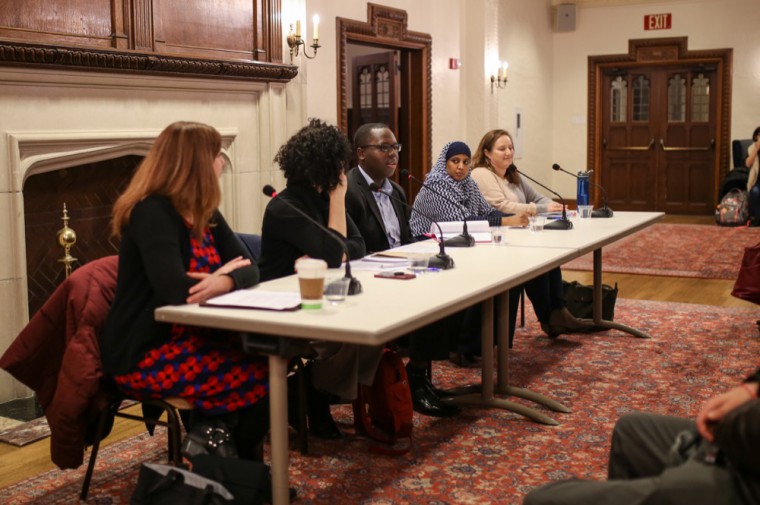Campus Events | News
GCP hosts panel on Muslim refugees and resettlement
The first-year Global Citizenship Program hosted a panel on Muslim refugees and their resettlement experiences Nov. 13.
The panel featured speakers with expertise in the academic study of refugees or who have experience in the resettlement process. The panelists answered questions concerning challenges facing Muslim refugees in the resettlement process, barriers particular to female refugees and the efforts to humanize these challenges.
 Anjali Vishwanath | Student Life
Anjali Vishwanath | Student Life Speakers at the Global Citizenship Program’s Muslim refugees and resettlement panel answer questions and give students advice about getting involved.
According to Brennan Keiser, coordinator for International Programming in the International and Area Studies Program, the students identified panelists by researching community organizations that aid the resettlement of refugees as well as professors on campus.
Sarah Paradoski, as the program coordinator for the Immigrant and Refugee Women’s Program in St. Louis, works with refugees who have resettled in the St. Louis area. She named isolation, cultural differences, lack of mental health resources and language barriers as key challenges that local refugees face.
“People don’t see how refugees can enrich communities,” Paradoski said. “[Refugees] are not just a completely separate group.”
Bahia Munem, a postdoctoral researcher in the Women, Gender and Sexuality department working on immigration and detention practices and policies, spoke from her experiences studying refugee resettlement in Brazil, whose policy concerning refugee resettlement is “much more open in general.”
Habiba Ibrahim, a Kenyan-born postdoctoral researcher in the Education department, emphasized the experiences of refugees across Africa before they come to the United States.
Ibrahim described the lack of policy framework in refugee camps, where education does not go beyond primary and secondary schools, and employment occurs in gray areas. The majority of refugees will never be resettled to Western countries, Ibrahim said, since the process is lengthy and only accepts the neediest of refugees.
Ariela Schachter, a professor in the sociology department, approached the discussion from an immigrant and race relations perspective. Schachter identified full legal and social citizenship as resettled refugees’ biggest problems, as well as facing negative stereotypes.
Following the panel, attendees were invited to explore a cultural showcase featuring photographs of murals and artwork created by refugees in the Middle East through the nonprofit Artolution.
“This is one of the most well-balanced panels that [GCP has] had in terms of different perspectives, not only in the identities represented but also academic perspectives and disciplines,” Keiser said.
Every semester, the Global Citizenship Program, a year-round program for first-years interested in understanding global affairs, hosts an event on an international topic of their choice.
“This year, a lot of [the students] already had an interest in refugees. I wanted them to focus a little bit, think about which refugees, from what country, what crisis are we talking about?” Keiser said. “We ultimately [decided on this topic] because of the political climate right now and some of the blowback from the travel ban that President Trump had [implemented].”
Senior Cara DiLiberti attended the event because she believed the topic has important social ramifications.
“As someone interested in American politics, I think it’s important to understand the experience of Muslim refugees in America,” DiLiberti said. “I think the most important aspects of the discussion were understanding the lack of structural support provided for recent refugees and the importance of demystifying the process, rather grounding the process in the hardships of cultural, political and other differences.”
At the end of the event, panelists gave students advice on how they could get involved with the refugee crisis.
“Refugees are represented [in the media] as a totality. People and their stories become numerical abstractions and not individual people,” Munem said. “Go volunteer, do drives, do tangible things to open your eyes to the realities [of Muslim refugees].”
